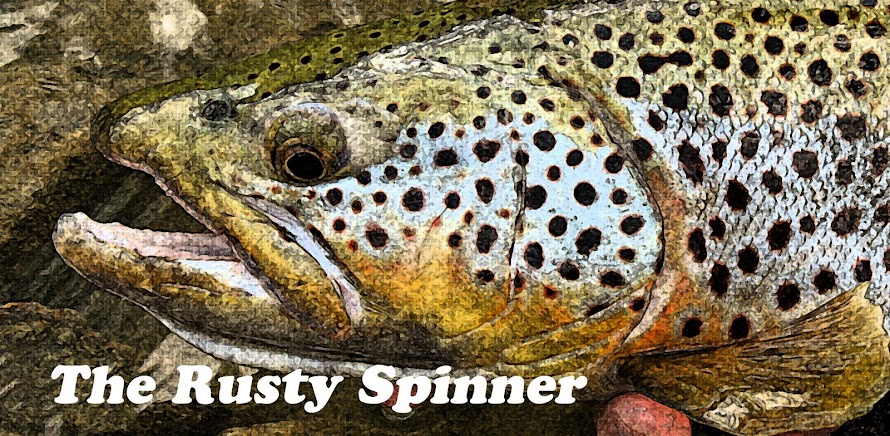"You kill me."
"Try this shake. It just kills."
"She's got killer ..."
Kill. The word derives from the Middle English cullen, which means "to deprive of life, cause the death of or to slay." In Dutch, the language of the original settlers of much of New York, kill takes on an entirely different meaning. For the Dutch, a kill was a "a deep trench between high banks, as a stream or a river." The Dutch derivation appears as part of the name of any number of northeast watersheds (i.e. Kaaterskill, Beaverkill, etc.). Blend the languages and the definitions of these two words, and you'll imagine a place not unlike the Battenkill, or the 'Kill as it's known among the bipolar flyflingers who regularly ply its currents.
Scattered across the country are a number of rivers that are notorious for producing impossibly wary fish and inherently difficult fishing. We're talking streams of dubious reputation and trout that seem gifted with extrasensory perception, an uncanny ability to distinguish mayflies from feathered forgeries. Several names come to mind: the Delaware, the Henry's Fork, Silver Creek, Hat Creek, Depuy's. Each of these streams has been written about ad infinitum, and each is known in its own way for emasculating the feather-chuckers who dare walk its banks. I'm fortunate to have fished a few of these rivers, and for the most part their reputations are well deserved. They're tough nuts to crack, but with a decent cast and a little local knowledge you can usually put the wood to 'em.
Then there's the Battenkill.
To illustrate my meaning more precisely, allow me a moment to digress and tell you about one of my favorite bamboo rods; a beautifully flamed quadrate that I picked up a few years back. It's a seven footer for a four weight, although I could probably go one step up or down and the rod would likely perform well enough. I've paired this rod with a Peerless 1A. If you unfamiliar with Peerless reels then do a Google search. The name says it all, but I digress. Understand that I really cannot afford this expensive a piece of gear (I'm a teacher for Christ's sake). It is an object that represents quite a bit of sweat equity on my part, even though both rod and reel were purchased at a steep discount. It is my pride and joy. Yep. It's my pride and joy, and I tossed it in the bushes when my temper got the best of me after one particularly frustrating evening on the Battenkill. It was a gentle toss more than a fastball, and I immediately retrieved the rod, but the point is that the river made me loonier than an animated rabbit dressed in viking attire, singing Wagner's, Flight of the Valkyries.
The irony is that it's hard not to fall in love with such a stream. The Kill possesses a pastoral beauty that is both striking and increasingly rare. Fishing the river, one is reminded the paintings of Grandma Moses or one of Norman Rockwell's Saturday Evening Post covers. Of course, both artists lived near the Kill. Rockwell's home and studio is less than 100 yards from the bank. Aside from Manchester center and a few areas near the river's confluence with the Hudson, the Battenkill valley is the proverbial land that time forgot. It hasn't changed in sixty or seventy years. Add to this the fact that the water itself just looks fishy, and you've the makings for a fine day of casting.
And expect to cast quite a lot because while the river is beautiful, she is also a harsh mistress. She'll coax. She'll tease. She'll make you beg, but she won't often give up her treasure. Of all the rivers I've fished the Battenkill is singularly the most perplexing I've encountered, and I grew up fishing its more remote sections. I caught my first trout there thirty years ago, and I am still a regular. I can say without boasting that I'm familiar with most every run and pool in both New York and Vermont (as far down as Rexleigh anyway). I know the river. I know its hatches, and I still have my arse handed to me on a regular basis.
Some folks will tell you the 'Kill is tough as it is simply because the fish aren't there. I disagree. I have seen as many trout on the Battenkill as I have on any other stream in the northeast. Granted, most of these fish are 6" to 12" brookies. There are, however, any number of wild browns that eclipse 20" and trout in excess of 24" aren't impossible to find. Catching those fish is an entirely different matter. You can't imagine how frustrating it to witness an eight inch brook trout follow your BWO for six feet before turning away and rejecting the imitation. It may be even more frustrating than watching a genuine leviathan follow a streamer and turn away at the last moment. One, you reasonably expect. The other you do not.
That is to say you don't expect these things unless, of course, you're a regular on the 'Kill.




